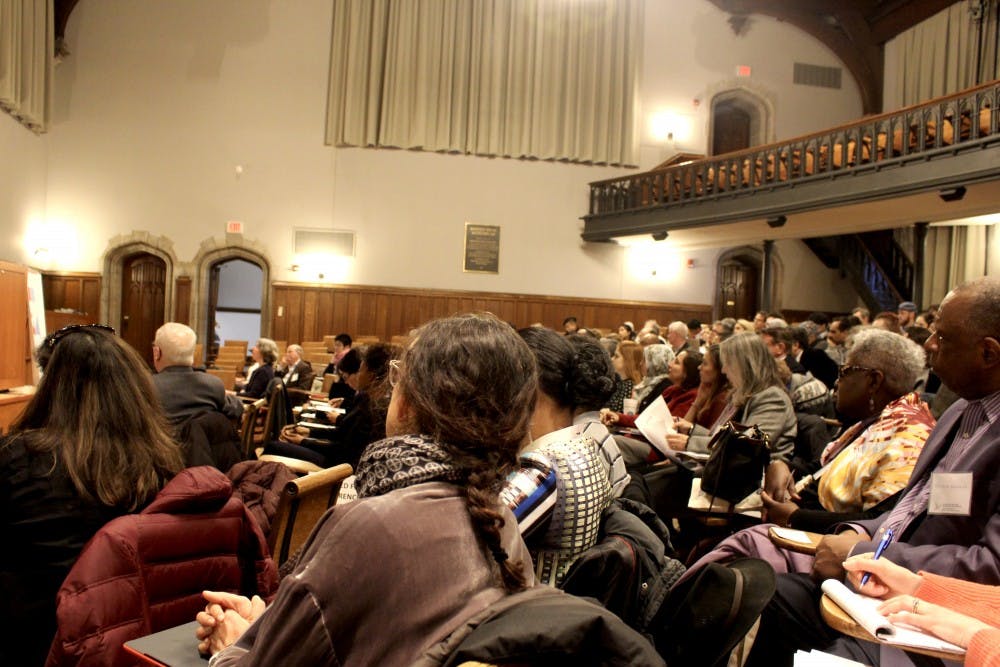On March 3 and 4, “Seeking Refuge: Faith-Based Approaches to Forced Migration,” the second conference in the Poverty and Peacemaking series was hosted by the Office of Religious Life and the Community of Sant’Egidio. The opening and closing panels of the conference took place in McCosh Hall, while the panel discussions were held in Chancellor Green.
Professors, politicians, UN representatives, NGO workers, and many other people from both the faith-based and the secular world came together during this weekend to confront and discuss issues of forced migration.
“Seeking Refuge” provided a platform for engaged conversations, budding friendships, and an experience of solidarity at a time of crisis. In her opening remarks, the Rev. Alison Boden, dean of religious life and the chapel, said that the idea most central to the conference was friendship. “It sounds simple, but our goal is for everyone at the conference to make at least one new friend.” Throughout the conference, this idea was echoed in the sentiment that we ought to help forced immigrants as we would help a friend in need.
Boden commended the passionate engagement of the 60 students who attended the conference, saying they were the “best advocates” for campus-wide awareness of refugee-related issues. She suggested that the University could further use its various cultural and linguistic resources for assisting refugee families and individuals.
Stanley Katz, a professor at the Wilson School and a conference participant, expressed similar hopes and concerns. An advocate for the moral responsibility of university institutions and academic disciplines, Katz expressed gratitude at the work done by the Pace Center and the Office of Religious Life.
At the same time, Professor Katz noted that the University is still not yet “well configured” enough with proactive social activities. This conference, he noted, is the first of its kind on campus in recent times, during which aiding refugees has become controversial, and it is “a good beginning.”
Sohaib Sultan, the University coordinator for Muslim life and a speaker at the conference, said he believes in concern for the refugees’ wellbeing as an act of responsibility rather than merely humanitarian compassion. Having personally worked with Muslim leaders in America to combat anti-refugee sentiments and Islamophobia, he emphasized that the refugees are fleeing from radicalism rather than promoting it.
According to Sultan, the refugee crisis “is the result of reckless American foreign policies in the past decade.” Consequently, he said that Princeton as a community, especially the American population, is responsible for addressing its problems. Sultan said he was happy that the conference allowed for conversations, collaboration, and a renewed sense of purpose for this shared cause.
Heba Gowayed, sociology Ph.D. candidate and a speaker at the conference, thought that the conference was important because it brought policy makers and researchers together to figure out the most practical and effective steps forward at this crucial political moment. As a researcher of Syrian resettlement in countries with different policy situations like the United States, Canada, and Italy, Gowayed views academic research as crucial to understanding what refugees’ lives would look like under different policies, and therefore, to designing the most optimal policies.
Dan-el Padilla Peralta, a classics professor, was one of the speakers in the opening panel of the conference. As a classicist, Peralta’s work focuses on what it means to be an immigrant and explores the subjectivity of a stranger in a foreign land. Peralta shared how the classics were actually inextricably linked with the topic of the conference. For example, Virgil’s epic poem “The Aeneid” is essentially about the immigrant experience — the movement, shock, and collision that arise upon a stranger’s arrival at a foreign land and founding of a new community. “Instead of teaching the texts in a traditional classroom setting,” Peralta said, “we could use other media — adaptations into play or short stories — to make them more accessible.”
Maya Wahrman, a main organizer of the conference in the Office of Religious Life, commented that the planning of the conference began last August. She explained that in addition to obtaining visas for some international participants, she faced the challenge of bringing such diverse groups of participants together for the conference. However, according to Wahrman, while diversity in conversations and participants may not a guarantee a completely ‘comfortable’ experience, it allows everyone to be involved in the conference in very distinct ways.


"The toughest truth is that, to put the margins at the center, we with privilege need to give up far more than most are comfortable with. How does this truth change things?
Imagine a circle of compassion. Imagine it growing until nobody is left out.
What about the people who simply don’t care?
Imagine a circle of compassion. Imagine it growing until nobody is left out.
Who is a refugee? God’s first priority. God gives preference to the refugee. Who are we that ignore and persecute refugees? We are nothing if we are not helping. I am nothing if I am not asking: What would you like? What do you need?"
It is in opening ourselves to others who have been wounded that we can awaken our own sense of having been broken, and our ability to offer and receive hospitality and friendship."
The conference ended with an interfaith ceremony, during which representatives of different faith groups read messages about “Seeking Refuge” from their respective faith groups. Finally, the student registration team read aloud names of people who had died in the process of migration while lighting candles in their honor. They explained that the names of these people had been written on the backs of each participant’s name tag, to be placed close to their hearts.
Beyond the conference setting, the Office of Religious Life is also taking the opportunity to partner with these different organizations to seek constructive outcomes. More information about the conference and its participants can be found here.








